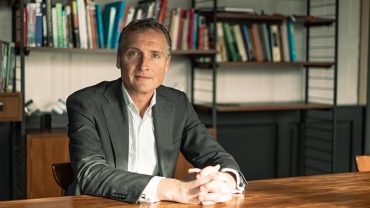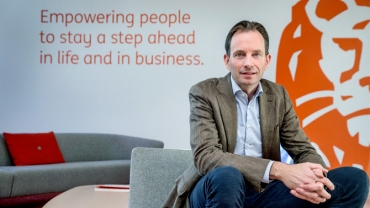
Finance workforce for the future
“This is a very exciting time to be in the function!” Gordon Toole does not hold back when we ask him to describe how he sees the finance function evolving in the coming years. The Philips Global Head of Financial Planning & Analysis speaks candidly about the Finance Workforce for the Future, adding “my perspectives are very much from my experience at Philips, but I think they are representative of where many other companies are heading.”
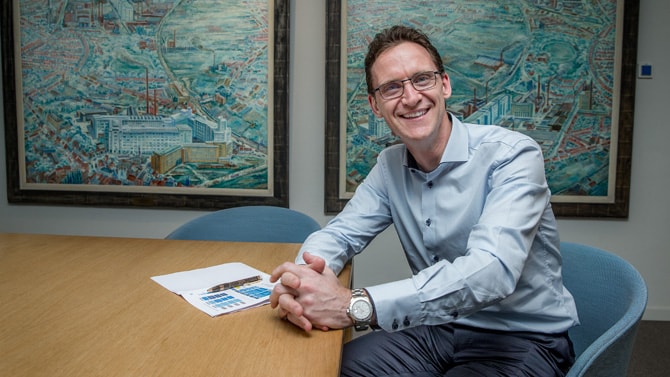
Gordon Toole
Podcast
Gordon Toole, Global Head of Financial Planning & Analysis at Philips, shares his vision on the future of finance. Listen to his podcast now.
Gordon Toole, Philips at heart
A Philips’ perspective. It is not strange that Gordon Toole makes this remark. The Irishman has spent almost 25 years in the company in the finance function in various roles and countries. After completing his university studies in Ireland in 1995, he started his career in France in Philips’ TV business. After two years, he moved to Philips’ mobile phone business, initially in the UK for two years, on to Sweden for another two years, then back to France for a further five years. Next came a move to the Netherlands in Philips’ corporate mergers & acquisitions team for three years. After roles in Philips’ Research and Personal Care teams, he moved to the Philips’ Financial Planning & Analysis team (FP&A) six years ago, ultimately leading the 350+ team since 2018.
“The finance function of the future will ultimately contribute its full potential by enabling the business to achieve its broader goals. This is no exception for Philips, as finance is helping the company on its transformation towards a service and solutions oriented health technology company and meeting its goal of improving 3 billion lives by 2030. "
The finance function, continuously evolving
“When I started in the function”, continues Toole, “each factory, distribution center or sales organization had its own dedicated finance team and they did everything locally. Transactions were handled through largely manual steps at all stages in the process. At the end of each month, results were submitted to headquarters for consolidation through cumbersome and manual processes. Similarly, reporting of results to business leaders took time and it took significant effort to provide significant detail or insights.
Since then, the function has evolved in a number of ways. As IT technologies developed, the processing of transaction became faster, notably transactions within the company became more streamlined. Consolidation of financial reporting also became more automated, faster and more precise. The next stage was to identify and regroup together the different job families within the function, allowing for harmonization of activities, for example bringing all credit & collections or all FP&A activities into one team. This led to more robust processes, stronger outcomes and greater productivity.
The latest step was to centralize specific teams in our General Business Service (GBS) centers mainly in India, Poland and Nashville. By bringing different teams into central sites, we allow these functions to start working more effectively together and making processes more efficient. Lastly, more granular data, available faster allowed for stronger and more impactful reporting and analysis helping business leaders to better manage their performance.”
Transforming the function
Transforming the function has required a lot of rigorous planning and continuous interaction with the different stakeholders. “If I take the recent example of establishing our GBS centers, we adopted a detailed plan to manage this important change. Firstly, we took the time to carefully identify which roles to move through a rigorous review of the design principles, making clear which roles can be more effective locally, which roles will be successful in our GBS centers. After agreeing the roles and activities to transfer, we detailed out the specific tasks and ensured the quality and clarity of the work instructions. In parallel, we began recruiting people for the role, bringing them onboard, teaching them Philips’ finance principles, and sending them to the particular market or business to learn the specific activities. Throughout the process, we engaged in an ongoing and open dialogue with the employees, work councils and business stakeholders. Lastly, for the teams remaining in our local locations and in our GBS centers, we recognized the need to continuously invest in strengthening the capabilities of our teams to ensure their skills remained fully relevant.”
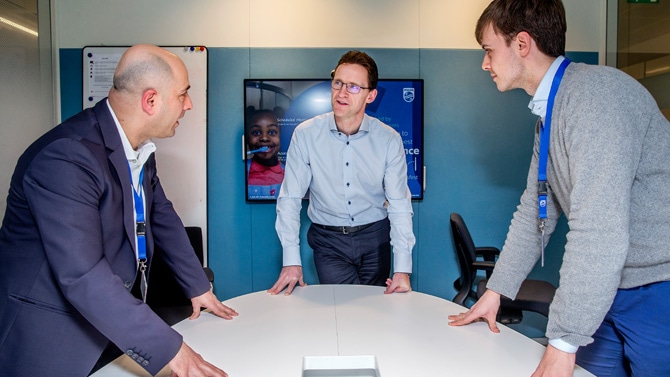
“We are in middle of a fundamental digital transformation. Consider the opportunities presented by robotized process automation, which removes the need for manual transaction processing. This of course leads to change in work content, our finance professionals are less needed to process transactions, but more to design and monitor the automated processes.”
Capabilities of the future
Gordon Toole emphasizes the attention needed to key capabilities required to be successful. “Speaking for Philips, we are investing in our Finance Workforce for the Future. The key starting point is to emphasize the core accounting and controlling skills of the teams. More & more we see the importance of process expertise to steer the quality of our work. Moreover, we need our teams to be fully knowledgeable on digital & technology trends and to know how to apply these in impactful Analytics and Predictive Modelling. Lastly, it is critical that our teams fully understand the new business opportunities the company is embracing, in Philips’ case as it moves from being a product oriented provider towards a service and solutions oriented health technology company.”
Driving control and integrity
“One of the key activities of the function is to secure the integrity of our reporting and controls, which becomes all the more critical as transactions multiply in terms of frequency and complexity. We do this by ensuring the teams are fully up to speed with the latest accounting rules and control framework, for example the recent IFRS 16 changes. We do this by maintaining a strong repository of our financial reporting and control directives, in addition to a well-established finance curriculum at our internal Philips University. In addition, our technical accounting and internal control specialists focus on ensuring correct understanding, interpretation and adherence to accounting policies through regular training sessions, webcasts and interactions on key topics. Lastly, our process specialists seek to establish strong transactional process controls embedded in our systems.”
Our processes are key
Process excellence becomes a critical skill, confirms Toole. “Often, we confuse flexibility and customization with agility. This is the wrong conclusion. In fact, through process simplification and harmonization, we drive scalability of our processes, reduction of errors and more effective control monitoring. As a function, we then can take on more load, making better use of our resources. This ultimately translates into higher quality outcomes. A further opportunity enabled by our GBS centers is to allow multiple functions to work together to manage end-to-end processes, typically coming together in agile scrum teams to optimize processes, unburdened by functional barriers.”
Automation and data at our fingertips
“We are in middle of a fundamental digital transformation”, Gordon Toole notes. “Consider the opportunities presented by robotized process automation, which removes the need for manual transaction processing, to name a few … purchase orders will be processing seamlessly, inter-company transactions will be settled instantaneously, payments will be reconciled immediately with invoices, accruals will be calculated and booked, process controls will be conducted in the background. This of course leads to change in work content, our finance professionals are less needed to process transactions, but more to design and monitor the automated processes.”
The digital transformation also makes information more immediately available to finance professionals & business stakeholders. “At the start of my career, it was a big deal to prepare pivot tables in Excel and copy paste them into PowerPoint slides”, reflects Toole, “but these were essentially manual processes which were person dependent and difficult to scale. Through digitalization, notably data warehouses, self-serve reporting portals and digital dashboards, we put reporting directly in people’s hands without the need for additional processing. Direct links to our accounting systems also allow us to drill down and gain specific details.”
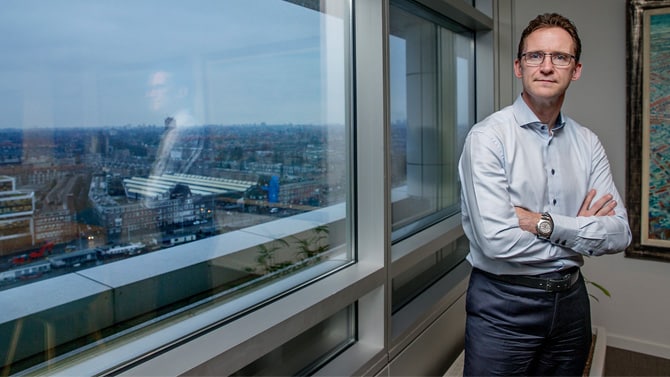
“At the start of my career, it was a big deal to prepare pivot tables in Excel and copy paste them into PowerPoint slides. But these were essentially manual processes which were person dependent and difficult to scale. Through digitalization, notably data warehouses, self-serve reporting portals and digital dashboards, we put reporting directly in people’s hands without the need for additional processing. Direct links to our accounting systems also allow us to drill down and gain specific details.”
The power of data and analytics
“Now that we have the data, what are we going to do with it?”, Gordon Toole questions. “Having great data and insights only serves us if we can use it to drive our business performance. There are a few aspects here. Do we fully understand our results? Here we are developing various ‘descriptive’ analytics, which help us understand our performance. Examples are variance/bridging analyses, pareto analyses, tornado charts to name a few, which allow us to quickly understand key performance drivers and steer course correction actions where necessary.
How precise are our plans? By using granular data, we are learning to build sophisticated ‘predictive’ models, which give more accurate forecasts of our business opportunities, allowing us to allocate resources more effectively. We are effectively removing a lot of planning biases form our plans relying on the objectivity of the data.
Lastly, how can we make better decisions faster? There is so much data available, both financial and non-financial, it is not possible for any single individual to absorb & synthesize it all effectively. By using the power of technology to compile and analyze market and competitors trends, we will develop ‘prescriptive’ analytics, which will allow us to quickly identify and seize business opportunities. The advent of artificial intelligence and machine learning will only enhance the speed and depth to which we can take these analytics.”
New business models
“The finance function of the future will ultimately contribute its full potential by enabling the business to achieve its broader goals”, reflects Gordon Toole. “This is no exception for Philips, as finance is helping the company on its transformation towards a service and solutions oriented health technology company and meeting its goal of improving 3 billion lives by 2030. This means developing new capabilities in the function in new business models, specific examples include the shift to digital/online; increase recurring revenue models, long term partnerships, co-financing/profit sharing models, pay-per-use models. The reality is that we will need the ingenuity and creativity of all our finance professionals to help us on this journey.”
Finance will continue to drive significant value
“The finance team of the future will fundamentally change”, Gordon Toole concludes. “As mentioned earlier our finance professionals will work less on pure transaction processing, much more on designing & monitoring the automated processes, designing the analytics requires to steer the business and interpreting their outcomes and advising their business stakeholders accordingly.
While accounting and controlling knowledge will always be a core skill, it will not be sufficient. We are working to build up the skills of our teams in specific areas… technical understanding of data and systems, the ability to synthesize multiple data sources and present outcomes, arguments and options, the ability to work in cross functional teams. Of course, changing the capabilities of a function as a whole does not happen from one day to the next… we have started by launching a program of awareness building in the areas described earlier across the function. We are then following up with specific training courses, often virtual to give full flexibility to our teams, to drive deeper learning, including specific project experience on real cases. I am convinced our compelling vision of the future of finance is a real incentive for our teams to take on these learning journeys. Not forgetting of course that our recruitment strategies have also evolved, from a focus on accounting & economics graduates to also bringing on board IT graduates, data scientists, liberal arts graduates, engineering graduates….
Reflecting on my career in Philips, I feel I have never stopped learning and taking on new skills and experiences, and so it is with the finance function itself. I really do see continuing to evolve, to remain relevant and essential to the performance of Philips, in fact all companies. Bring on the next 25 years!”
A final reflection on the role of finance during a time of crisis and uncertainty
"The publication of this reflection on the future of finance coincides with the advent of the COVID-19 crisis", adds Gordon Toole. "We are living through unprecedented times with COVID-19 ravaging the world incurring thousands of deaths and much suffering, many companies are faced with unbelievable threats and also opportunities, in the case of Philips we are convinced our Health Technology solutions will contribute to stemming the pandemic. Our teams find themselves in a lock down situation, working from home, virtually connected, and balancing the work with looking after their (often very young) families. Within Finance, we are also asking a lot more from our teams … we have implemented COVID-19 reporting, we are re-running our forecast processes more regularly to get a more precise view of our future performance, and the uncertainties create more work, scenarios, analyses, bridges etc....
My first reflection is on the agility of our teams, I have seen fantastic examples of individual personal investment & resilience, and also teams collectively rallying together to get the work done to high quality. My next thought turns to the strong insights we are generating at great speed. In such times of uncertainty, our bridges and scenarios bring the insights our leaders need to make decisions quickly. We may be in a crisis, we may be not fully relaxed, but we are calm and the strong work of our finance professionals contribute to this. Lastly, while there are significant efforts and even frustrations as we grapple with these challenges, I believe we will look back on them as contributing significantly to our personal and professional development, strengthening our skills for the future. In this spirit, I sincerely hope that all remain safe and healthy in these challenging times."
Contact us












